New Faculty 2015-2016
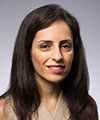
Niaz Abdolrahim
Assistant Professor of Mechanical Engineering
Niaz Abdolrahim joined the Department of Mechanical Engineering in July 2015 as assistant professor. She recently completed her postdoctoral appointment at the Massachusetts Institute of Technology’s Department of Materials Science and Engineering, where she investigated the computational modeling of interface structure and interface-defect interactions in metallic films.
Abdolrahim is experienced in solid mechanics, continuum mechanics, plasticity, crystal plasticity, finite element methods (FEM), molecular dynamics simulations, Monte Carlo methods, nanoscale metallic composites, thin films, nanoporous materials, multiscale modeling of materials, computational solid mechanics, and mathematical modeling.
Abdolrahim received her PhD in mechanical engineering from Washington State University. Her research was on the multiscale modeling of dislocation mechanisms in nanoscale metals, with scales ranging from the atomistic, to crystal plasticity, to the continuum level via molecular dynamic simulations. Her work on computational materials science spans the nanomechanical properties of modern engineering materials where defects and interfaces control essentially the material macroscopic response.
Among other awards, in 2013 Abdolrahim received the James Clerk Maxwell Young Writers prize from the Philosophical Magazine and the Henry DeWitt Smith Scholarship from the Minerals, Metals & Materials Society. She has served as guest editor for the Journal of Nanomaterials and as discussion leader of a Gordon Research Conference in July 2014. She has published in more than 30 journals including Philosophical Magazine, Thin Solid Films, International Journal of Plasticity, and Computational Materials Science. She has participated in a variety of outreach activities such as a nanotechnology workshop for high school students.
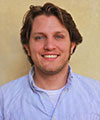
Scott Abramson
Assistant Professor of Political Science
Scott Abramson recently joined the Department of Political Science as assistant professor. He earned his PhD from Princeton University, where he was a graduate fellow at the Neihaus Center for Globalization and Governance. He received his MS from the London School of Economics and his AB from Dartmouth College. Most recently, he was a Max Weber Fellow at the European University Institute in Florence, Italy.
In addition to exploring the origins of the modern territorial state, Abramson examines the ways in which political regimes transmit power across generations, the causes of the industrial revolution, and the effects of new military technologies on Japanese state-formation during the Sengoku period. His research uses a combination of formal, quantitative, and historical methods to focus on political development and state formation.
Abramson’s current book project is The Production, Predation, and the Origins of the Territorial State. Using a new dataset describing the existence, location, and boundaries of every European state between 1100 and 1789, this book represents the first-ever set of systematic empirical tests of competing theories of state formation. To do this, Abramson combined traditional historical analysis with statistical analysis.
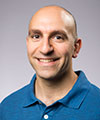
Paul Audi
Associate Professor of Philosophy
Paul Audi joined the Department of Philosophy as associate professor. He comes from the University of Nebraska–Omaha, where he was an associate professor (2013 to 2015) and an assistant professor (2007 to 2013). Prior to that, he was a visiting instructor in philosophy at Colgate University. Audi received his BA from Colgate University in 2001 and his PhD in philosophy from Princeton University in 2007.
As a metaphysician and philosopher of mind, Audi’s research focuses on the nature of properties and relations of determination and dependence. He writes that in the study of minds and morals, in order to definitively establish that some kind of entity exists, one must take a stand on what sorts of properties there are, which ones are fundamental, and how those that are fundamental give rise to those that are not.
Audi’s work on the concept of grounding has been at the center of recent debates about relationships of determination. A related strand of his work concerns mental causation and how mental phenomena could influence physical phenomena in the way that a commonsense understanding of human action assumes.
Audi has taught courses on critical reasoning, ethical theory, logic, metaphysics, philosophy of the mind, and philosophy of language. He has also taught an advanced writing seminar for philosophy majors. He has published in many journals, including Noûs, Philosophical Studies, and the Journal of Philosophy and served as associate editor for the third edition of the Cambridge Dictionary of Philosophy.
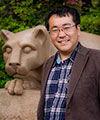
Yu Awaya
Assistant Professor of Economics
Yu Awaya joined the Department of Economics as assistant professor. Awaya is a game-theorist whose work has focused primarily on the theory of repeated games. In his thesis, Awaya examines the issue of price-fixing by firms. While antitrust laws prohibit explicit agreements among firms to rig prices––and hence also communication among firms about such matters––there remains the question of whether firms can somehow contrive such pricing arrangements tacitly even when it is difficult for them to monitor the decisions of their rivals through communication. Awaya’s paper shows how it is possible for firms to collude, and it helps us understand how to detect such behavior.
In 2014, Awaya’s paper “Community Enforcement with Observation Costs” was published in the Journal of Economic Theory. He has given presentations on economic theory around the world and has refereed for the International Journal of Economic Theory and the Journal of Political Economy.
Awaya received a BA in engineering and an MA in economics from Kyoto University, Japan, in 2005 and 2008, respectively. As a graduate student, he was awarded the Bates White Fellowship in 2013. He earned his PhD from Pennsylvania State University in 2015, where, as a teaching assistant, he taught intermediate microeconomics for five years.
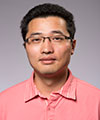
Xuwen Chen
Assistant Professor of Mathematics
Xuwen Chen joined the Department of Mathematics as assistant professor. He received his PhD in mathematics from the University of Maryland–College Park in 2012. Prior to coming to Rochester, he served as a Tamarkin assistant professor at Brown University from 2012 to 2015.
Chen works on the analysis of partial differential equations. He is interested in dispersive equations and kinetic theory. His research on the rigorous analysis of many-body systems has been published in the Archive for Rational Mechanics and Analysis and the Journal of the European Mathematical Society. He has also published in a variety of journals including the Analysis & PDE, Communications in Mathematical Physics, and Journal de Mathématiques Pures et Appliquées. His current research is funded by a National Science Foundation grant.
Chen was the co-organizer for Brown’s 2014–15 seminar on partial differential equations. Over the years, he has taught a variety of courses, including intermediate calculus and linear algebra. He has also been invited to speak at Princeton University, Massachusetts Institute of Technology, University of California–Los Angeles, and at 28 other seminars and conferences around the world.
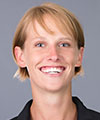
Hayley Clatterbuck
Assistant Professor of Philosophy
Hayley Clatterbuck recently joined the Department of Philosophy as assistant professor. She earned her MA and PhD in philosophy from the University of Wisconsin–Madison in 2012 and 2015, respectively, and her BA in philosophy from the University of Nebraska–Lincoln in 2008.
Clatterbuck is a philosopher of science, with expertise in formal epistemology and research projects in philosophy of biology and philosophy of cognitive science. Her dissertation, Are Humans the Only Theorizers? A Philosophical Examination of the Theory-Theory of Human Uniqueness, examines the hypothesis that humans are unique in having evolved the capacity to theorize or reason about theoretical entities, events, and relations in a way analogous to the use of theories in scientific practice.
Her dissertation re-evaluates fundamental issues in the philosophy of science and philosophy of mind that raise problems for the theory-theory, showing how insights from these fields can be used to clarify and defend the view.
Clatterbuck’s publications have focused on chimpanzee mindreading, the epistemology of thought experiments, and evolutionary drift and selection and have appeared in such publications as Mind & Language, Synthese, and Biology and Philosophy. She has also refereed for the latter two publications.
Clatterbuck has taught introduction to philosophy courses in addition to classes on contemporary moral issues, ethics, and philosophy and the sciences. She cofounded the Women in Philosophy group at Wisconsin and has presented at a half dozen conferences and events in North America. She is also the recipient of Wisconsin’s capstone teaching award, a Mellon-Wisconsin summer dissertation grant, and four fellowships at Wisconsin.
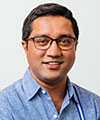
Gourab Ghoshal
Assistant Professor of Physics and Astronomy
Gourab Ghoshal joined the University this year as assistant professor of physics and astronomy with joint appointments in the Departments of Computer Science and Mathematics. Prior to this, he served as a research scientist in the Department of Earth and Planetary Sciences at Harvard University. He was also a member of Harvard’s multidisciplinary Origins of Life initiative.
Ghoshal is trained as a statistical physicist and works in the field of complex systems. His research interests are in the theory and applications of complex networks as well as nonequilibrium statistical physics, game theory, econophysics, dynamical systems, and the origins of life. He is the editor of a book on complex networks (published by Springer), and his work has been published in Nature, Science, and Physical Review Letters.
Hailing from New Delhi, India, Ghoshal received his BSc and MSci degrees in theoretical physics from the University of London in 2004. He did his doctoral- thesis work at the University of Michigan–Ann Arbor and earned his PhD in physics in 2009. At that time, he attended the prestigious complex systems summer school at the Santa Fe Institute and the Theoretical Physics School at Les Houches, near Chamonix in France.
Following his PhD, Ghoshal was a postdoctoral scientist jointly at Northeastern University and Harvard Medical School as well as a visiting scientist at Massachusetts Institute of Technology’s Media Lab.
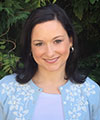
Catherine (Cassie) Glenn
Assistant Professor of Clinical and Social Sciences in Psychology
Cassie Glenn joined the Department of Clinical and Social Sciences in Psychology as assistant professor. She received her BA from the University of Virginia in 2004 and her PhD in clinical psychology from SUNY Stony Brook University in 2012.
Glenn completed her clinical internship at the University of Mississippi Medical Center and VA Medical Center. Most recently, she finished a postdoctoral fellowship in the Department of Psychology at Harvard University funded by the National Institute of Mental Health.
Glenn’s research aims to advance understanding of the psychological processes that lead to suicidal and self-injurious behaviors and the ability to predict which individuals are at greatest risk for self-harm.
Given that suicidal and self-injurious behaviors initially begin, and increase drastically, during adolescence, her research is particularly focused on the development, prediction, and ultimate prevention of these behaviors in youth. She uses a multimodal approach to examine the complex interplay among risk factors across self-reported, behavioral, psychophysiological, and neurobiological units of analysis, in both cross-sectional and prospective designs.
To support this work, Glenn has received grant funding from the National Institute of Mental Health, the American Foundation for Suicide Prevention, the Military Suicide Research Consortium (Department of Defense), and the Society of Pediatric Psychology. She has published in such peer-reviewed journals as the American Journal of Preventive Medicine, the Journal of Clinical Child and Adolescent Psychology, and the Journal of Abnormal Psychology.
In addition to her research, Glenn will teach undergraduate and graduate courses and mentor PhD students in the clinical psychology training program.
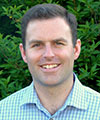
Thomas Howard
Assistant Professor of Electrical and Computer Engineering and of Computer Science
In January 2015, Thomas Howard joined the faculty of the Department of Electrical and Computer Engineering and the Department of Computer Science as assistant professor. He is also a member of the Goergen Institute for Data Science and holds a secondary appointment in the Department of Biomedical Engineering.
Most recently, Howard was a research scientist at Massachusetts Institute of Technology Computer Science and Artificial Intelligence Laboratory in the Robust Robotics Group. Prior to that, he was a research technologist at NASA’s Jet Propulsion Laboratory ( JPL) in the Mobility and Robotic Systems section and a lecturer in mechanical engineering at the California Institute of Technology (Caltech).
Howard earned a PhD in robotics from the Robotics Institute at Carnegie Mellon University in 2009 and BS degrees in electrical and computer engineering as well as mechanical engineering from the University of Rochester in 2004.
Howard’s research interests span artificial intelligence, robotics, machine learning, signal processing, and human-robot interaction. His work focuses on improving the optimality, efficiency, and fidelity of models for decision making in complex and unstructured environments with applications to robot motion planning and natural language understanding. He has applied his research to numerous robots, including planetary rovers, autonomous automobiles, mobile manipulators, robotic torsos, and unmanned aircraft.
Howard was a member of the flight software team for the Mars Science Laboratory, the motion planning lead for the JPL/Caltech DARPA (Defense Advanced Research Projects Agency) Autonomous Robotic Manipulation team, and a member of Tartan Racing, which was the winner of a DARPA Urban Challenge.
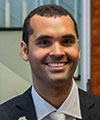
Stephen Kleene
Assistant Professor of Mathematics
Stephen Kleene joined the University this year as assistant professor of mathematics. He was a visiting member of the mathematics department at Brown University during the 2014–2015 academic year and a National Science Foundation Fellow/ CLE Moore Instructor at Massachusetts Institute of Technology from 2010 to 2014.
In 2010, Kleene earned a PhD in mathematics from Johns Hopkins University. His doctoral thesis was on singular behavior of minimal surfaces. In 2004, he earned a BA in mathematics with highest distinction from the University of Rochester.
Kleene’s research is principally in geometric analysis and differential geometry, with an emphasis on the theory of minimal surfaces and mean curvature flow and related equations. Some of his recent work has been focused in the construction of various examples of solitons for the mean curvature and related flows, which arise as singularities.
Kleene has been invited to give presentations throughout the United States and in Brazil, Canada, and Italy and has taught a variety of calculus, linear algebra, and differential geometry courses. From 2011 to 2014, he co-organized MIT’s Geometric Analysis Seminar. He is awaiting publication of several papers on such topics as immersed self-shrinkers, logarithmically spiraling helicods, and the non- compactness in moduli spaces of embedded finite topology minimal surfaces. He has also served as a referee on papers that have appeared in the Journal of Geometric Analysis, the Proceedings of the American Mathematical Society, and the Transactions of the American Mathematical Society.
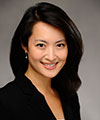
Catherine K. Kuo
Associate Professor of Biomedical Engineering
Catherine Kuo recently joined the University of Rochester as associate professor at the Hajim School’s Department of Biomedical Engineering and at the Medical Center’s Center for Musculoskeletal Research.
Prior to this, Kuo was at Tufts University, where she was an assistant professor in the Department of Biomedical Engineering and in the Program of Cell, Molecular, and Developmental Biology within its Sackler School of Graduate Biomedical Sciences. She was also a visiting scientist in the Department of Chemical Engineering at Massachusetts Institute of Technology.
Kuo received her BSE in materials science and engineering and PhD in biomaterials and macromolecular science and engineering from the University of Michigan. She conducted her postdoctoral training at the National Institutes of Health (NIH), specifically within the Branch of Cartilage Biology and Orthopaedics of the National Institute of Arthritis and Musculoskeletal and Skin Diseases.
Her research explores musculoskeletal tissue mechanobiology and developmental biology in order to inform tissue engineering and regenerative medicine approaches. A specific focus of her work is to characterize the mechanical and biochemical microenvironments of embryonic, healing, diseased, and aging tissues to provide design criteria for biomaterials and bioreactor cultures that guide stem cell differentiation and neo-tissue formation.
Kuo is the recipient of a National Science Foundation (NSF) CAREER Award and a March of Dimes Basil O’Connor Starter Scholar Research Award. She was invited by the National Academy of Engineering as one of only 15 outstanding U.S. engineers under the age of 45 to participate in the 2013 German-American Frontiers of Engineering Meeting. She reviews for the NIH, NSF, and other agencies. She also serves on the advisory council for the International Society of Ligaments and Tendons and on the editorial review board for the Journal of Orthopaedic Research.
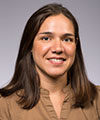
Amanda Larracuente
Assistant Professor of Biology
Amanda Larracuente is assistant professor in the Department of Biology. She received her BS in biology from Canisius College and her PhD in genetics from Cornell University in 2003 and 2010, respectively. Larracuente was a postdoctoral researcher at the Whitehead Institute at the Massachusetts Institute of Technology from 2009 to 2011 and, later, a Ruth L. Kirschstein National Research Service Award Postdoctoral Fellow at the University of Rochester.
Larracuente researches the mutational and population genetic forces that shape genome evolution, organization, and content. She is interested in the most enigmatic features of eukaryotic genomes, including Y chromosomes and evolutionarily “selfish” DNAs (genetic entities that parasitize genomes). Her lab uses computational, population genomic, cytological, and molecular methods and Drosophila fruit fly species as models.
Larracuente investigates the evolutionary forces that cause Y chromosomes to degenerate over time. She also studies the evolution and molecular mechanisms of segregation distorter genes that obtain transmission advantages by subverting mechanisms of normally fair Mendelian inheritance.
Recently, Larracuente made pioneering empirical and methodological advances in understanding the function and evolution of satellite DNAs, an abundant but long-neglected class of highly repetitive DNA enriched near the centromeres of chromosomes. Her work helps to explain how familiar features of eukaryotic genomes result from evolutionary histories involving recurrent molecular arms races between hosts and their genomic parasites.
Larracuente has published in Genetics, Nature, and Molecular Biology and Evolution, among other academic journals.
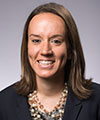
Ellen Matson
Assistant Professor of Chemistry
Ellen Matson joined the Department of Chemistry after completing a postdoctoral appointment at the University of Illinois at Urbana–Champaign.
At Illinois, she studied the synthesis and reactivity of molecular complexes containing transition metal atoms from the first row of the periodic table. These complexes were of keen interest due to their unique electronically flexible ligand platforms.
In 2013, Matson completed her PhD in inorganic chemistry at Purdue University, where she investigated the chemical reactivity of molecular complexes containing the radioactive element uranium. Prior to her educational and training time in the Midwest, Matson obtained her BA in chemistry and BS in science education at Boston University, both in 2009.
Matson seeks to develop a research program focused on the extension of the traditional definition of “ligand” from organic molecules designed to provide “protection” for reactive metal atoms to bound molecules. These can intimately participate in and guide chemical reactivity.
Research projects in the Matson lab visualize alternative applications of fundamental inorganic molecular building blocks in order to design and synthesize novel first-row transition metal molecular complexes. Molecular complexes that are capable of facilitating multi-electron chemical transformations have direct biological, environmental, and industrial applications. Matson’s novel synthetic approaches underlie a creative research program focused on the investigation of new types of cooperative metal-ligand reactivity.
Matson has published in a variety of publications including Organometicallics, Inorganic Chemistry, and the Journal of the American Chemical Society.

Jude Mitchell
Assistant Professor of Brain and Cognitive Sciences
Jude Mitchell studies visual processing and selective attention as assistant professor in the Department of Brain and Cognitive Sciences. He works to understand the principles governing brain activity, eye movements, and their roles in perception.
It has long been understood that attending to one object, such as a friend at a crowded party, can almost completely filter out sensory inputs from the background. This ability is impaired in developmental and psychiatric disorders, leading to severe cognitive disruption. Mitchell’s research has led to important discoveries, such as how different classes of neurons in the brain contribute to attention and how attention reduces noise in neural circuits to improve perception. In recent years, Mitchell has pioneered using a New World monkey (the common marmoset) as a model for visual neuroscience. This model offers several practical advantages for understanding the human brain, including the opportunity to study genetic models of mental disease.
Mitchell’s background includes both computational and experimental approaches to the study of neuroscience. After receiving a BS from Harvard University in electrical engineering, he gained experience with computational methods during his graduate studies in the cognitive science department at the University of California–San Diego. He continued more focused neuroscience postdoctoral research at the Salk Institute in La Jolla, California.
Mitchell has published in many publications, including Neuron, the Journal of Neuroscience, and the Journal of Vision. He has received awards from the Kavli Institute, the Swartz Foundation, the National Institutes of Health, and the National Science Foundation.
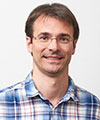
Ronni Pavan
Associate Professor of Economics
Ronni Pavan recently joined the Department of Economics as associate professor. His research focuses on labor economics and urban economics.
In a series of papers, Pavan has documented the causes for the wage premium observed in large cities relative to small ones and has analyzed the impact of city size on income inequality. For this work, he received a National Science Foundation grant. In a separate line of work, Pavan has been studying the interplay of human capital, in particular its acquisition through education and income.
Pavan has published a number of articles in top journals such as the Review of Economic Studies, Review of Economics and Statistics, Journal of Labor Economics, and Journal of Human Resources. He is an associate editor for the European Economic Review. Pavan is a fellow with the Rimini Center for Economic Analysis in Italy, serves on the program committee for Royal Economic Society meetings, and has been invited to give presentations around the world.
Pavan earned his MA and PhD from the University of Chicago in 2002 and 2005, respectively. He received his laurea in economics from the Ca’ Foscari University of Venice in Italy in 1999. Pavan was a faculty member at the Department of Economics at the University of Rochester from 2005 to 2013, at which time he left to join Royal Holloway, University of London. He has taught a variety of undergraduate and graduate courses on time series econometrics, microeconomics, labor economics, and evaluation methods.
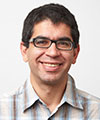
Juan Rivera-Letelier
Professor of Mathematics
Juan Rivera-Letelier joined the University this year as professor of mathematics. He comes to Rochester from Pontificia Universidad Católica in Santiago, Chile. He earned his PhD at Université de Paris Sud in 2002 and has held various positions since then, including at Brown University, where he was a distinguished visiting associate professor, and at the Institute for Mathematical Sciences at SUNY Stony Brook, where he was a postdoctoral researcher.
Rivera-Letelier’s research is primarily in the area of dynamical systems, which can be described as the theory of long-term behavior of maps under iteration. The main focus of his research has been on one-dimensional systems of diverse origin: arithmetic, p-adic, real, and complex. He has recently applied ideas from dynamical systems to the study of statistical mechanics, in particular, the area of low temperature phase transitions.
Rivera-Letelier has published more than 40 research papers in a variety of journals, including Inventiones Mathematicae and Advances in Mathematics. His most recent papers were on the statistical properties and the thermodynamic formalism of real and complex maps.
Rivera-Letelier has been awarded grants from such organizations as ECOS/ CONICYT, FONDECYT (the National Fund for Scientific and Technological Development of Chile), and the European Union Research Training Network. He has served on myriad scientific committees and panels. Early in his career, he received numerous mathematical Olympiad medals.
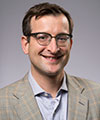
Steven Rozenski
Assistant Professor of English
After a year conducting research as an Alexander von Humboldt Postdoctoral Research Fellow in Göttingen, Germany, Steven Rozenski joined the English department as assistant professor. He received his AM and PhD in English from Harvard University in 2008 and 2012, respectively, and an MTh in theology and religious studies from the University of Glasgow’s School of Divinity in 2003.
Rozenski’s research focuses on devotional culture and translation in late- medieval England and Germany, incorporating perspectives from both art history and musicology. He is particularly interested in investigating the networks of cultural exchange and strategies of translation that led to the success of the most popular literary texts of the period.
Rozenski’s scholarship has appeared in a number of journals, including Early Music History, Études Anglaises, Exemplaria, Mystics Quarterly, Parergon, and Word & Image. It has also appeared in such edited collections as The Medieval Mystical Tradition (ed. Jones) and Musik der mittelalterlichen Metropole (ed. Kolb). Rozenski is coeditor, with Julia Perratore and Elisa Foster, of the forthcoming Devotional Interaction in Medieval Britain and Its Afterlives. His current book project is entitled Wisdom’s Journey: Continental Mysticism and Popular Devotion in Trans-Reformation England.
During this past summer, Rozenski participated in a National Endowment for the Humanities Summer Seminar, “Arts, Architecture, and Devotional Interaction,” at the University of York. His research and teaching have been supported by fellowships and grants from the Alexander von Humboldt Foundation (2014– 2015), the Harvard College Fellows program (2012–2014), and the German- American Fulbright Commission (2003–2004).
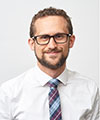
Andrew White
Assistant Professor of Chemical Engineering
Andrew White joined the University of Rochester in January 2015 as assistant professor of chemical engineering. He graduated from Rose-Hulman Institute of Technology in 2008 with a BS in chemical engineering. At Rose, he spent a year studying at the Otto-von Guericke Universität in Magdeburg, Germany. While there, he worked for six months in a microbiology lab at the Max Planck Institute for Dynamics of Complex Technical Systems.
White completed a PhD in chemical engineering at the University of Washington in 2013. His thesis was on the creation of non-fouling surfaces with computational modeling. From 2013 to 2014, White was a postdoctoral fellow at the University of Chicago’s Institute for Biophysical Dynamics. At Chicago, he developed new methods for mixing simulations and experiments.
At Rochester, White continues his modeling work of combining simulations and experiments in peptide self-assembly and glassy liquid crystals. Some of the tools he uses include molecular dynamics, dynamic graphical models, peptide synthesis, and self-assembly characterization. His research involves computer- aided design of materials.
White is also an accomplished artist. His work appeared in Science and Nature in 2010 and at the Visualization Center Museum in Sweden in 2013.
